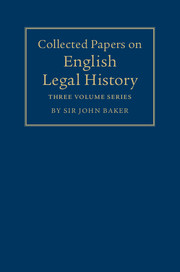Book contents
- Collected Papers on English Legal History: Volume I
- Contents
- List of Illustrations
- Acknowledments
- List of Abbreviations
- Introduction
- PART I The Legal Profession
- PART II The Inns of Court and Chancery
- PART III Legal Education
- PART IV Courts and Jurisdictions
- Collected Papers on English Legal History: Volume II
- Contents
- PART V Legal Literature
- PART VI Legal Antiquities
- PART VII Public Law and Individual Status
- 49 Personal Liberty under the Common Law 1200–1600
- 50 An English View of the Anglo-Hibernian Constitution in 1670
- 51 Human Rights and the Rule of Law in Renaissance England
- 52 Equity and Public Law in England
- PART VIII Criminal Justice
- Collected Papers on English Legal History: Volume III
- Contents
- PART IX Private Law
- PART X General
- Bibliography of the Published Works of Sir John Baker
- Index
50 - An English View of the Anglo-Hibernian Constitution in 1670
from PART VII - Public Law and Individual Status
Published online by Cambridge University Press: 05 December 2014
- Collected Papers on English Legal History: Volume I
- Contents
- List of Illustrations
- Acknowledments
- List of Abbreviations
- Introduction
- PART I The Legal Profession
- PART II The Inns of Court and Chancery
- PART III Legal Education
- PART IV Courts and Jurisdictions
- Collected Papers on English Legal History: Volume II
- Contents
- PART V Legal Literature
- PART VI Legal Antiquities
- PART VII Public Law and Individual Status
- 49 Personal Liberty under the Common Law 1200–1600
- 50 An English View of the Anglo-Hibernian Constitution in 1670
- 51 Human Rights and the Rule of Law in Renaissance England
- 52 Equity and Public Law in England
- PART VIII Criminal Justice
- Collected Papers on English Legal History: Volume III
- Contents
- PART IX Private Law
- PART X General
- Bibliography of the Published Works of Sir John Baker
- Index
Summary
English lawyers have a good precedent for regarding Ireland with respect and affection. Sir Edward Coke, in his Fourth Institute, pointed out that ‘whilst the liberal sciences in Europe lay in a manner buried in darkness, then did their lustre shine forth most clearly here in Ireland; thither did our English Saxons repair, as to a fair or market of good letters…’. And as with the Church so with Jurisprudence, for ‘there is no nation in the Christian world,’ said Coke, ‘that are greater lovers of justice…than they are, which virtue must of necessity be accompanied with many others; and, besides that, they are descended of the ancient Britons, and therefore the more endeared to us.’ Yet it is a foolhardy Englishman who would lecture the Irish in Belfast on the constitutional relationship between Ireland and England. This particular fool intends not only to stay securely in the past but to concentrate attention on a debate which occurred in 1670, in a case concerning Scotsmen, argued by English lawyers in Westminster Hall: a case which, by secretion in the obscurity of the English law reports, seems as yet to have escaped discussion by the historians of Ireland.
Although the case of 1670 makes extensive use of historical records, the present lecture will be less concerned with the facts of Irish history than with the legal analysis of the facts as perceived by seventeenth-century lawyers. What, for them, was the nature of the union with Ireland?
- Type
- Chapter
- Information
- Collected Papers on English Legal History , pp. 911 - 932Publisher: Cambridge University PressPrint publication year: 2013



